How to Use Straw as Mulch in Your Organic Garden
Mulch is really important for an organic garden. I love using straw as mulch in my garden because it’s cheap ($14 for a huge bale), it’s pretty, and it naturally decomposes.
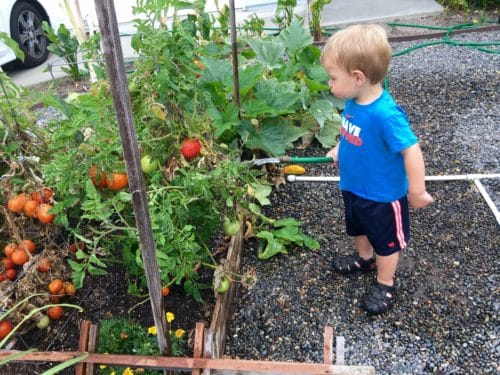
Mulch is really important for an organic garden. I love using straw as mulch in my garden because it’s cheap ($14 for a huge bale), it’s pretty, and it naturally decomposes.
Why Do You Need Mulch?
Mulch helps trap the moisture in the soil, and it keeps it warm, damp and fertile. Whether you are trying to get more blooms from your flowers or a bigger harvest of fruits and vegetables, what you need is living, fertile, active soil to produce a fabulous garden.
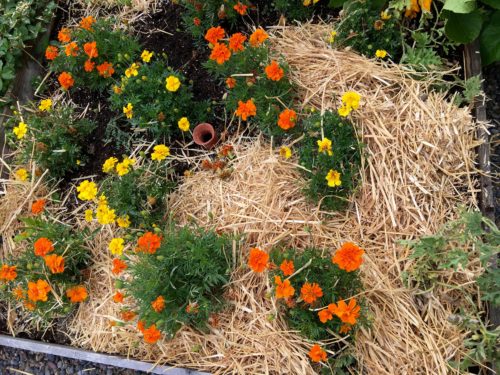
Every time I plant vegetables (up to 4 times a year here in Los Angeles, since we can plant all year long) I start with bags of compost and manure (steer or chicken manure) which I buy at the hardware store. (You can also make your own compost with a composter.)
How to Use Mulch and Why It Works
I use the compost and manure to amend and enrich the soil. In other words, I work it in to the existing soil as I’m planting. The compost and manure feeds the soil nutrients.
After you amend the soil, you want to add some kind of mulch on top to lock in all the goodness. The mulch, like I said above, helps to retain moisture and keeps the soil more fertile. If you don’t use mulch, your soil will get all dried out and eroded.
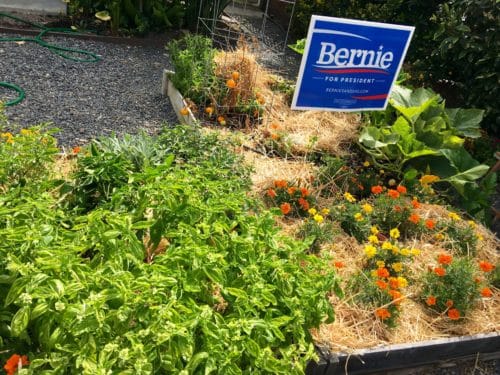
Have you ever seen what soil looks like under a pile of dead leaves after it’s been sitting there for a while? That’s what we call “black gold”. It’s rich and dark and crumbly and smells like earth. This is what happens to soil when it’s sitting under mulch.
This is when you get worms and all kinds of creepy crawlers that help to break down the organic matter. The soil becomes aerated and oxygenated — instead of hard and sense. And this is what produces the best environment for plants to grow.
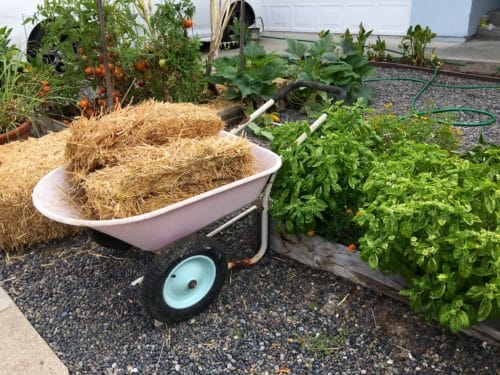
Why Straw is My Favorite Mulch
I do not like bark chips because they take longer to decompose and they are often treated with toxic chemicals. I love using straw because it breaks down quickly and it’s very inexpensive.
I buy my straw bales from a feed store in Malibu (found it on Google). They are very cheap — only $14 per bale. I’m sure they are probably cheaper in other parts of the country. Even at $14/bale, that’s a whole lot of mulch and a fraction of what it would cost to buy bark or other kinds of mulch.
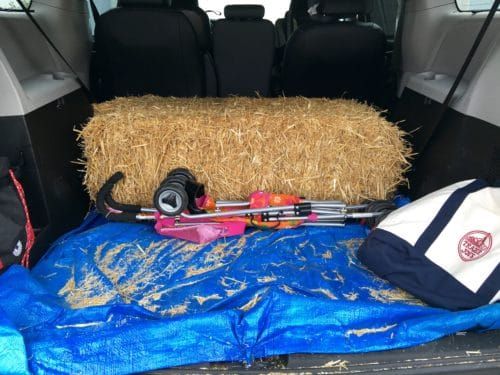
The straw bales are huge. You will need a minivan or a truck to get them home. I fit two in the minivan. You should definitely put a tarp down since the straw gets everywhere.
Oh, and make sure you don’t get HAY bales, which apparently look exactly like straw bales and they are sold the same way. From what I have read, hay bales will sprout and you’ll be planting seeds. So you want to make sure what you are buying is STRAW, not HAY.
This is what my garden beds look like after adding the straw mulch.
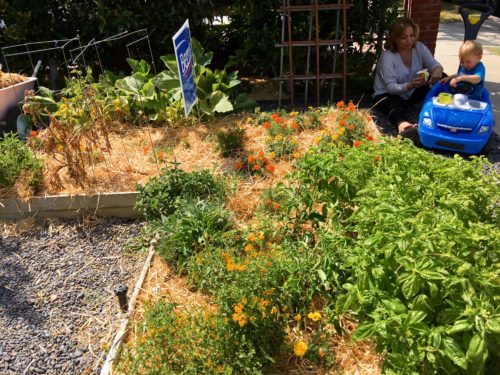
If you can’t find straw bales in your area, look for other organic materials you can use in your garden that are available locally. For example, if you live near pine forests, you may be able to find pine needles. You may also be able to find untreated wood chips, or you can make your own mulch from branches and sticks with a wood chipper.
The result of using compost and mulch is great soil which produces fabulous vegetables and blooming flowers.
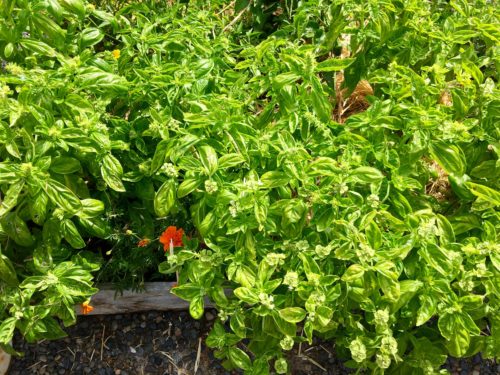
Check out my basil! It’s nuts! I seriously need to make more pesto.
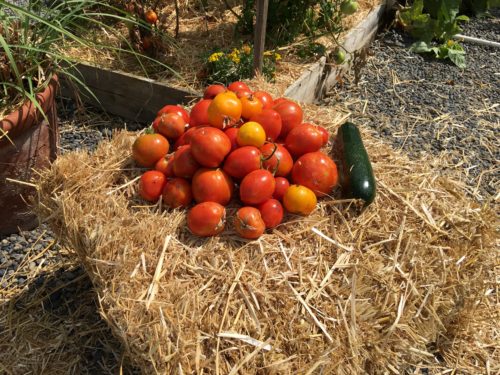
So far I’ve harvested at least 50 tomatoes and I just planted two more tomato starts so I can get another harvest. This spring I got over 50 artichokes from plants I put in 3 years ago. I do nothing to them; they are perennials so they just keep coming back.
I hope this post inspires you to get out and grow some food.
UPDATE: A reader on my Facebook page notified me of the following:
Most straw has been sprayed glyphosate, which is not good for an organic garden and has been named a probable carcinogen by the World Health Organization. You would have to find organic straw bales which can be difficult. When grain is harvested, straw being the waste product so to speak, it is sprayed with Monsanto’s glyphosate.
My response: I looked this up and it seems like it is true, the wheat is typically sprayed with glyphosate. So if you are doing a certified organic garden, you obviously can’t use just any straw. You would need to use organic straw, which, yes could be tough to find.
That said, I am OK with using regular straw. I also do not go out of my way to procure organic manure or organic compost for my garden. I use the stuff from the regular hardware store.
If you are concerned about any pesticide residue, you should look for all organic materials for your garden. I’m an 80/20 person. I don’t spray any pesticides or herbicides on my plants and that is good enough for me. Is it perfect? No. But I’m OK with that.
SECOND UPDATE:
Well… I did a little cursory research on this and it looks like this is completely overblown. Looks like this issue of “glyphosate drenched wheat” blew up last year after an article was published by Sarah Pope of The Healthy Home Economist. Definitely warrants more research.
I will write a blog post about it but for now, the net net is I wouldn’t worry about the glyphosate on the straw you use on your garden. Any contamination will be very minimal, to the point of this being a non-issue.
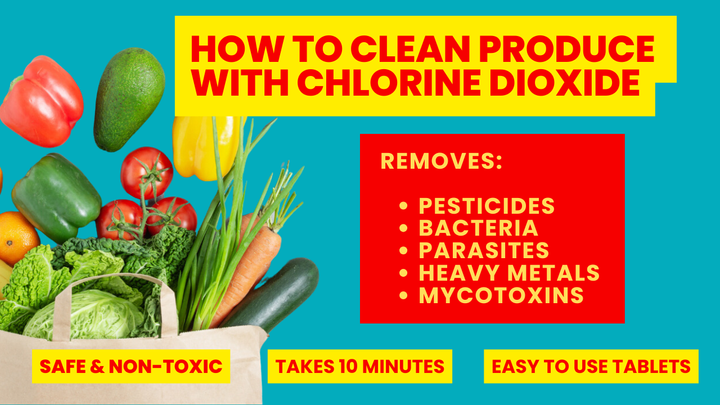

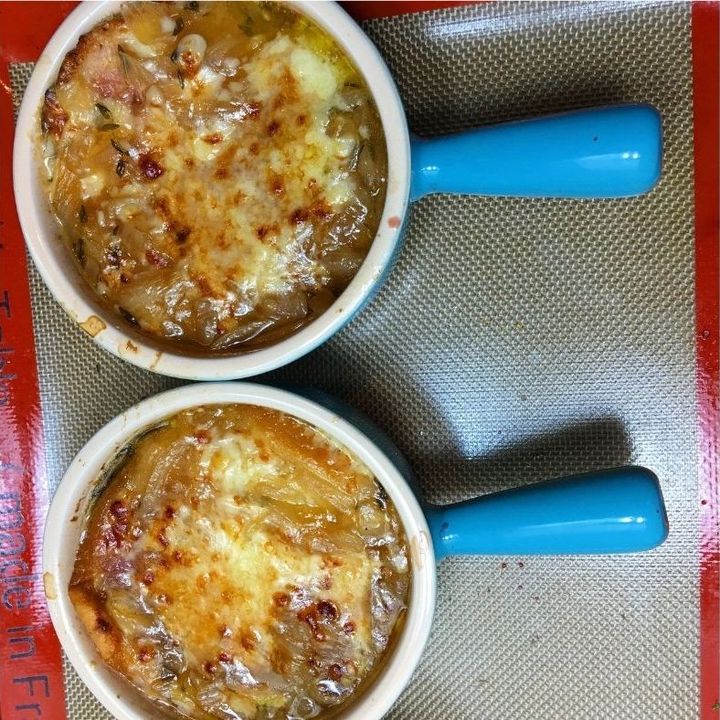
Comments ()